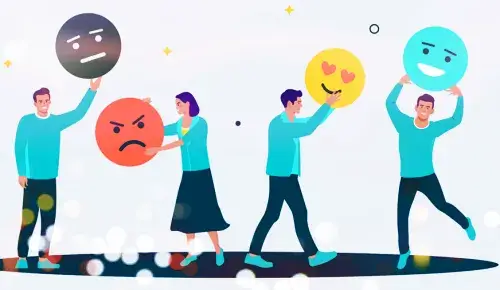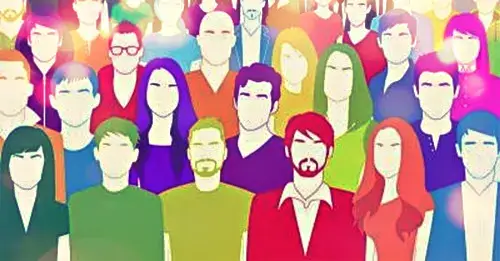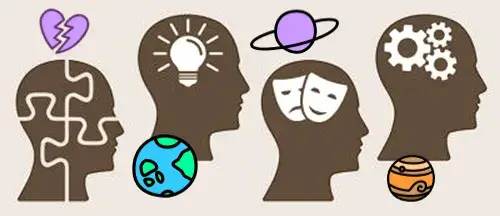Types. In real life, changing our preferences in romantic partners is not easy. This can trap us in a vicious cycle, repeatedly entering relationships with people who display the same “red flags.”
People types is he a set of traits that makes someone attractive in our eyes.
Behavior patterns, personality, hair and eye color, voice tone, political views, fashion choices, these all serve as internal reference points in our search for the ideal partner.
Types and ideal partner.
Researchers from the University of Toronto explored whether people really do tend to date partners who resemble their exes. The answer was yes: in most cases, current and past partners had enough in common to be grouped into the same “type.”
Interestingly, extroverts who are open to new experiences were less likely to pursue relationships with someone who resembled a previous partner. However, scientists from the University of California, Davis, found that we’re not always aware of what our “type” really is.
In their study, some participants emphasized traits like “funny” and “attractive” as priorities in a partner. But when others mentioned qualities like “intelligent” and “considerate,” the first group started valuing those traits too.
The takeaway?
We shouldn’t get too fixated on one “type”, sometimes we don’t even know what we truly like.
What Shapes Our Type? Despite these findings, we don’t fall for every “funny” or “smart” person. A wide range of psychological factors shape our preferences.
Physical Appearance.
Whether we’re swiping through dating apps or noticing someone at a café, the first thing we notice is appearance. Symmetrical features and a well-proportioned figure are classic indicators of physical attractiveness, at least on a subconscious level.
But looks aren’t everything. A 2015 study involving 35,000 participants asked them to rate the attractiveness of various faces. Consensus was reached in only 50% of cases. The other half, the researchers suggest, came down to individual experience.
In another part of the study, researchers examined the aesthetic preferences of twins. If genetics and shared upbringing strongly influenced taste, their preferences should have been similar, but they weren’t.
The conclusion?
We tend to find people attractive when they resemble those we’ve had positive experiences with. The more familiar a face feels and the more positive emotions we associate with it the more likely we are to find it appealing.
Similarity to Ourselves.
The pop-culture idea that “opposites attract” doesn’t hold up under scrutiny. In reality, we’re more likely to be attracted to people who share our personality traits, political views, core values, and social background.
We may also prefer romantic partners who resemble us physically, as we associate this familiarity with trustworthiness and kindness.
Similarity to Our Parents.
Our earliest relationship models are formed in childhood. Often unconsciously, we’re drawn to partners who resemble our parents or even siblings. For example, daughters whose fathers showed care and affection toward them and their mothers are more likely to fall for someone similar.
Similarly, men are more likely to be attracted to women who resemble their mothers if their mothers had a healthy and open attitude toward sexuality.
Personality traits matter too. In another study, participants were asked to describe eight characteristics of their opposite-sex parent, their current partner, and their ideal partner.
The results showed that in at least four of the eight categories, partners resembled the participant’s parent.
How to Change Your Type.
Reflect on Past Experiences. Self-reflection can reveal unhealthy relationship patterns and help you make more conscious decisions. Ask yourself:
• Do you tend to face the same conflicts or break up for similar reasons?
• What have you learned about your needs and boundaries?
• In what areas are you willing—or not willing—to compromise?
• What are your core values, and how can your future relationships reflect them?
• Have you done anything that undermined past relationships?
If you find yourself stuck in an unhealthy cycle, a conversation with a therapist might help break it.
Meet Different People.
Give a chance to those who don’t fit your usual “type.” Try blind dates or ask friends to set you up. Why is this worth it?
• You’ll better understand what you really want—or don’t want—in a partner. Maybe you thought you were into extroverts but end up bonding deeply with an introvert.
• It broadens your dating mindset. Even if you don’t meet “the one,” you’ll gain openness and adaptability.
• You might discover new sides of yourself. Someone completely different could introduce you to hobbies or perspectives you never considered.
Allow Yourself to Evolve.
Our values and perspectives naturally change over time. In youth, attraction often centers on physical chemistry and shared interests. Later, we may prioritize emotional support and reliability, especially as we take on new responsibilities like career growth or raising a family.
As early influences fade, don’t shy away from change. Focus on your goals and personal development. Whether it’s new hobbies, health improvements, or professional success, these achievements build self-confidence. A sense of independence and emotional safety reduces attachment anxiety, laying the foundation for healthier, more stable relationships.
What It Means to Be Yourself in a Relationship.
To explore this, researchers from Adelphi University (USA) and Western Sydney University (Australia) studied the role of authenticity the ability to drop social masks and express genuine feelings and thoughts in romantic and sexual relationships. They identified two core elements of authentic behavior:
1. Rejection of Deceit — Authentic individuals avoid lying and won’t tolerate dishonesty from others.
2. Willingness to Take Risks — They’re open to emotional vulnerability and aren’t afraid to be themselves with a partner.
Findings showed that people who valued honesty and were willing to be vulnerable were better long-term partners. They were more empathetic, committed, and uninterested in casual flings.
Those with lower authenticity fell into two categories:
• Manipulators (exhibiting narcissism, Machiavellianism, or psychopathy), who used others and focused on short-term gratification.
• Fearful Avoidants, who struggled to open up due to fear of rejection and attachment anxiety. However, with the right support, even they can learn to embrace authenticity and build meaningful connections.
How Authenticity Manifests in Different Dating Scenarios?
Participants described how they’d act authentically in three romantic contexts:
1. Casual Sex.
Authentic individuals were less likely to seek casual sex, but if they did, they were upfront about their intentions. They presented themselves confidently, flirted playfully, and showed interest in spending time with the partner before becoming physically intimate.
2. Serious Dating.
In early stages of dating with long-term intentions, authentic people still used humor and flirtation but placed more emphasis on emotional connection. They dressed casually, wore minimal or no makeup, and focused on meaningful conversations over surface-level attraction.
3. Committed Relationships.
Here, authenticity was at its fullest. These individuals emphasized honesty, stayed true to themselves, and spent more time with their partners—including introducing them to family and discussing future plans like marriage. Physical intimacy followed emotional closeness.
How to Be Yourself While Looking for a Partner.
Authenticity is a powerful strategy for finding the right partner—especially for long-term love. The challenge lies in embracing vulnerability and self-expression.
Be Brave.
Past traumas and fears often block authenticity. But by challenging negative beliefs and learning to cope with rejection, you can build trust, express yourself freely, and connect more deeply with potential partners.
Have a Great Day!







